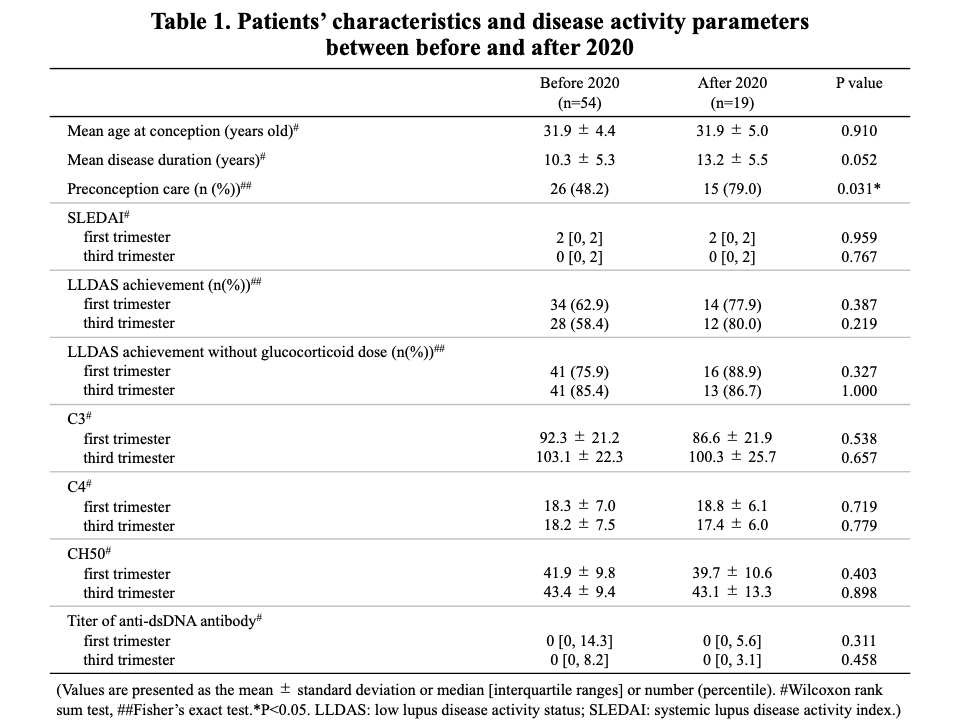Session Information
Date: Tuesday, October 28, 2025
Title: (2195–2226) Reproductive Issues in Rheumatic Disorders Posters
Session Type: Poster Session C
Session Time: 10:30AM-12:30PM
Background/Purpose: Women with systemic lupus erythematosus (SLE) are at increased risks for adverse pregnancy outcomes (APOs) including preterm birth, low birth weight and preeclampsia (1,2). We previously reported that these APOs are related to uncontrolled high disease activity and specific treatments, particularly the dose of glucocorticoid (3,4). In 2020, the American College of Rheumatology (ACR) published guideline for the management of reproductive health, emphasizing the importance of preconception care and transitioning to pregnancy-compatible medication (5). This study aimed to assess whether treatment strategies and pregnancy outcomes in women with SLE changed after the publication of the 2020 ACR guideline at a single center.
Methods: We analyzed the data from SLE patients who had been treated at our institution during planning for pregnancy and subsequently gave birth from rheumatic disease pregnancy registry. Patients were divided into two groups: those who conceived before 2020 and those who conceived after 2020. We retrospectively compared patients’ characteristics, disease activity, treatments, and pregnancy outcomes between the two groups.
Results: A total of 73 pregnancies in 55 patients were included: 54 pregnancies occurred before 2020 and 19 after 2020. Table 1 showed patients’ characteristics and disease activity. There were no significant differences in age at conception or disease duration between two groups. However, the rate of preconception care implementation was significant higher after 2020 (P=0.031). No significant differences were observed in any disease activity parameters between two groups. Regarding treatment before and during pregnancy, the proportion of glucocorticoid (GC) use was significantly higher after 2020 (P=0.008 and 0.016, respectively, Figure a), although the mean GC dose was lower compared to the group before 2020 (P=0.067 and 0.022, respectively, Figure b). The use of immunosuppressants and hydroxychloroquine was significantly more common after 2020 (P< 0.001, Figure c,d). While no significant differences in pregnancy outcomes were found (Table 2), the incidence of SLE flares and preterm premature rupture of membrane tended to be lower in the cases after 2020 (P=0.126, 0.182, respectively), whereas the rate of hypertensive disorder of pregnancy tended to be higher (P=0.078).
Conclusion: Following the publication of the 2020 ACR guideline, preconception care became more widely implemented Additionally, the use of immunosuppressants and hydroxychloroquine during pregnancy increased, while lower doses of GC were used. These findings suggest that the 2020 ACR guidelines have significantly influenced treatment strategies for women with SLE who desire pregnancy.Reference:1. Clowse ME, Jamison M, Myers E, James AH. Am J Obstet Gynecol. 2008;199:127.e1-6.2. Bundhun PK, Soogund MZ, Huang F. J Autoimmun. 2017;79:17-27.3. Shimada H, Wakiya R, Kanenishi K, et al. Arthritis Res Ther. 2022;24:10.4. Shimada H, Wakiya R, Kameda T, et al. Lupus. 2023;32(7):833-841.5. Sammaritano LR, Bermas BL, Chakravarty EE, et al. Arthritis Care Res. 2020;72:461-88.
To cite this abstract in AMA style:
Shimada H, Mino R, Miyagi T, Sugihara K, Ushio Y, Mizusaki M, Chujo K, Manabe N, Wada M, Nakashima S, Dobashi H. Impact of the 2020 ACR Reproductive Health Guidelines on Treatment Strategies and Pregnancy Outcomes in Women with Systemic Lupus Erythematosus: A Single-Center Retrospective Study [abstract]. Arthritis Rheumatol. 2025; 77 (suppl 9). https://acrabstracts.org/abstract/impact-of-the-2020-acr-reproductive-health-guidelines-on-treatment-strategies-and-pregnancy-outcomes-in-women-with-systemic-lupus-erythematosus-a-single-center-retrospective-study/. Accessed .« Back to ACR Convergence 2025
ACR Meeting Abstracts - https://acrabstracts.org/abstract/impact-of-the-2020-acr-reproductive-health-guidelines-on-treatment-strategies-and-pregnancy-outcomes-in-women-with-systemic-lupus-erythematosus-a-single-center-retrospective-study/


.gif)
.gif)